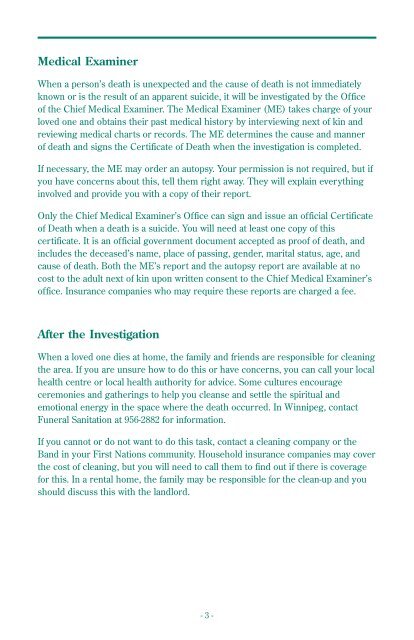After a Suicide - Practical Personal Guide for Survivors
After a Suicide - Practical Personal Guide for Survivors
After a Suicide - Practical Personal Guide for Survivors
Create successful ePaper yourself
Turn your PDF publications into a flip-book with our unique Google optimized e-Paper software.
Medical Examiner<br />
When a person’s death is unexpected and the cause of death is not immediately<br />
known or is the result of an apparent suicide, it will be investigated by the Office<br />
of the Chief Medical Examiner. The Medical Examiner (ME) takes charge of your<br />
loved one and obtains their past medical history by interviewing next of kin and<br />
reviewing medical charts or records. The ME determines the cause and manner<br />
of death and signs the Certificate of Death when the investigation is completed.<br />
If necessary, the ME may order an autopsy. Your permission is not required, but if<br />
you have concerns about this, tell them right away. They will explain everything<br />
involved and provide you with a copy of their report.<br />
Only the Chief Medical Examiner’s Office can sign and issue an official Certificate<br />
of Death when a death is a suicide. You will need at least one copy of this<br />
certificate. It is an official government document accepted as proof of death, and<br />
includes the deceased’s name, place of passing, gender, marital status, age, and<br />
cause of death. Both the ME’s report and the autopsy report are available at no<br />
cost to the adult next of kin upon written consent to the Chief Medical Examiner’s<br />
office. Insurance companies who may require these reports are charged a fee.<br />
<strong>After</strong> the Investigation<br />
When a loved one dies at home, the family and friends are responsible <strong>for</strong> cleaning<br />
the area. If you are unsure how to do this or have concerns, you can call your local<br />
health centre or local health authority <strong>for</strong> advice. Some cultures encourage<br />
ceremonies and gatherings to help you cleanse and settle the spiritual and<br />
emotional energy in the space where the death occurred. In Winnipeg, contact<br />
Funeral Sanitation at 956-2882 <strong>for</strong> in<strong>for</strong>mation.<br />
If you cannot or do not want to do this task, contact a cleaning company or the<br />
Band in your First Nations community. Household insurance companies may cover<br />
the cost of cleaning, but you will need to call them to find out if there is coverage<br />
<strong>for</strong> this. In a rental home, the family may be responsible <strong>for</strong> the clean-up and you<br />
should discuss this with the landlord.<br />
- 3 -



